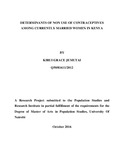| dc.description.abstract | The study set out to establish the factors associated with non use of contraceptives among sexually active married women of reproductive age in Kenya. The study used data drawn from the 2008-09 Kenya Demographic and Health Survey (KDHS). The study was based on a sample of 1,751 women who were married, not pregnant or breastfeeding and were sexually active. The study adopted the framework developed by Casterline et al., (2001) which focused on a constellation of factors that act as obstacles to contraceptive use. Descriptive statistics cross tabulations and chi-square and logistic regression analysis were used to analyze the data.
The findings show that there is a significant association between selected demographic factors(age, parity and desire for children), socio-economic factors (region, wealth status and education),socio cultural(religion),programmatic factors(exposure to family planning messages via mass media and contact with health professionals) with non use of contraceptives among married women in Kenya. Logistic regression results indicate that age, parity, woman‟s level of education, region of residence, wealth status, contact with health professionals and informed of family planning and desire for more children significantly affect non use of contraceptives among married women in Kenya. Non use of contraceptives declines with increase and with parity. The more educated a woman is the less likely the woman is a non user of contraceptives. The findings show women with primary education and those with secondary education were less likely to be non users of contraceptives compared to women who had no education. The same pattern is observed for with respect to household wealth status. Women who had contact with health professionals and informed of family planning were less likely to be non users of contraceptives compared to those who had not had contact with health professionals.
The main policy implications that can be drawn from this study are that there is a need for more emphasis on the education of women in order to reduce the non use of contraceptives among married women. The findings of this study show that household wealth status significantly affects non use of contraceptives therefore there is need to integrate economic empowerment aspects in FP programmes in Kenya especially targeting women from poor wealth quintiles. There is need for further research on the influence of the husbands or partners on the non use of contraceptives | en_US |



